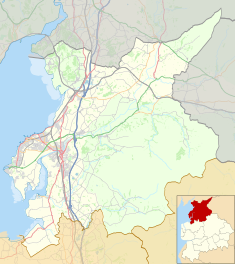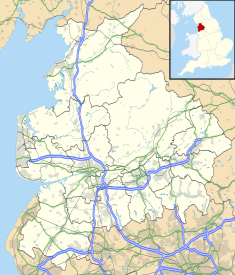Cockersand Abbey
| Cockersand Abbey | |
|---|---|
 The chapter house | |
| Location | Thurnham, Lancashire |
| Coordinates | 53°58′37″N 2°52′30″W / 53.977°N 2.875°W |
| Official name | Cockersand Premonstratensian Abbey |
| Designated | 13 January 1915 [1] |
| Reference no. | 1018919 |
Listed Building – Grade I | |
| Official name | The Chapter House, Cockersand Abbey |
| Designated | 2 May 1968 [2] |
| Reference no. | 1362525 |
Cockersand Abbey is a former abbey and former civil parish near Cockerham in the City of Lancaster district of Lancashire, England. It is situated near the mouth of the River Cocker. It was founded before 1184 as the Hospital of St Mary on the marsh belonging to Leicester Abbey. It was refounded by the Cambro-Norman magnate, Theobald Walter, 1st Baron Butler, as a Premonstratensian priory in 1190. It was subsequently elevated to an abbey in 1192. It also continued as a hospital.[3] The Abbey was originally located in marsh land which was later drained, becoming known as St. Mary's of the Marsh.
The abbey was dissolved in 1539 and acquired by a John Kitchen. The site is now adjacent to a farm house and the only significant relic is the still intact, vaulted chapter house which was built in 1230 and used as a family mausoleum by the Daltons of Thurnham Hall during the 18th and 19th centuries.[4] The land was acquired by the Daltons shortly after 1556, when Robert Dalton married Ann Kitchen[5] There are some scrappy remains of the church adjacent. A tradition that the medieval choir stalls in the nearby Lancaster Priory originated from here has been discredited.[citation needed]
The chapter house is a Grade I listed building and Scheduled Ancient Monument. In 2007 English Heritage made an £80,000 grant to the owner to help preserve the building.[4] The chapter house is open to the public on special occasions such as Heritage Open Days.
Two Roman silver statuettes were discovered on Cockersand Moss near the abbey site in 1718, possibly indicating the presence of a Romano-British shrine nearby.[6]
List of dignitaries
- Hugh (Garth) the Hermit ‘Master of the Hospital’ (before 1184)
- Henry (?–1190)
- Thomas 'Abbas de Marisco' (1194–1199)
- Roger 'Abbas de Marisco', 'abbas de Kokersand' (1205–6)
- Hereward (fl. 1216–1235)
- Richard de Freckleton (fl. 1240)
- Henry (fl. 1246–1261)
- Adam de Blake (fl. 1269–1278)
- Thomas (fl. 1286–1288)
- Robert of Formby (fl. 1289–1290)
- Roger (fl. 1300)
- Thomas (fl. 1305–1307)
- Roger (fl. 1311–1331)
- William of Boston (fl. 1334–1340)
- Robert of Carleton (fl. 1347–1354)
- Jordan of Bosedon (fl. 1354–1364)
- Richard (fl. 1382)
- Thomas (fl. 1386–1389)
- William Stamford (fl. 1393)
- Thomas of Burgh (fl. 1395–1403)
- Thomas Green (1410–1444?)
- Robert Egremont (1444–c. 1474)
- William Lucas (–1477)
- William Bowland (1477–1490)
- John Preston (1490–1502?)
- James Skipton (1502–1505)
- Henry Stayning (1505–1509)
- John Croune (1509–?)
- George Billington (fl. 1520–1522)
- John Bowland (fl. 1524–1527)
- surnamed Newsham (?)
- Gilbert Ainsworth (1531)
- Robert Kendal (1531–1533)
- Robert Poulton (1533–1538/9)[3]
Civil parish
The civil parish of Cockersand Abbey was created as a local government unit in 1858, and was part of Lancaster Rural District. It was abolished and incorporated into Thurnham civil parish in 1935.[7] The population was recorded as 26 in 1871, 53 in 1901, and 25 in 1931[8] The parish included the area around the abbey and extended north and south along the coast.[9]
Media gallery
-
Engraving of the chapter house at Cockersand Abbey
-
The Lancashire Coastal Way passes the site of the abbey
-
Surviving fragment of a wall
See also
- Grade I listed buildings in Lancashire
- Scheduled monuments in Lancashire
- Listed buildings in Thurnham, Lancashire
- List of monastic houses in Lancashire
- Abbeys and priories in England
References
Footnotes
- ^ Historic England. "Cockersand Premonstratensian Abbey (1018919)". National Heritage List for England. Retrieved 28 January 2012.
- ^ Historic England. "The Chapter House, Cockersand Abbey (1362525)". National Heritage List for England. Retrieved 28 January 2012.
- ^ a b Farrer & Brownbill (1908), pp. 154-9
- ^ a b "Ancient abbey is saved by grant". BBC News. 21 June 2007. Retrieved 21 November 2008.
- ^ The History Of Thurnham Hall https://thurnhamhall.com/history/
- ^ Cockersand Moss Archived 14 July 2007 at the Wayback Machine, Roman Britain.org.
- ^ "Cockersand Abbey CP: Relationships and changes". www.visionofbritain.org.uk. Retrieved 15 May 2020.
- ^ "Cockersand Abbey CP: Total Population". www.visionofbritain.org.uk. VIsion of Britain. Retrieved 15 May 2020.
- ^ "Cockersand Abbey CP: Boundary Map". www.visionofbritain.org.uk. VIsion of Britain. Retrieved 15 May 2020.
Sources
- Anthony New. A Guide to the Abbeys of England And Wales, pp. 116–117. Constable.
- Farrer, William; Brownbill, J., eds. (1908), "A History of the County of Lancaster: Volume 2", Victoria County History, retrieved 27 January 2012
External links
- Premonstratensian monasteries in England
- Monasteries in Lancashire
- Grade I listed buildings in Lancashire
- Scheduled Ancient Monuments in Lancashire
- Christian monasteries established in the 12th century
- Buildings and structures in the City of Lancaster
- 1180s establishments in England
- Grade I listed monasteries
- Former civil parishes in Lancashire







